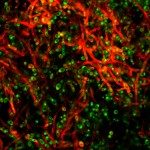Lien vers Pubmed [PMID] – 12377555
Trends Microbiol. 2002 Oct;10(10):456-62
Opportunistic fungal pathogens are an important cause of fatal invasive diseases and one of the many threats facing immunocompromised patients. Because of the limitations of the antifungal therapies currently available such as their toxicity, their narrow spectrum and the emergence of resistant pathogens, there is a significant demand for a broader antifungal arsenal. The characterization of genes essential for fungal growth will be an important step in the identification and development of novel antifungal drugs. Original strategies and new technologies including in vivo or in vitro transposon mutagenesis and post-transcriptional gene silencing are being developed for genome-scale identification of essential genes in fungal species that are pathogenic to humans.

